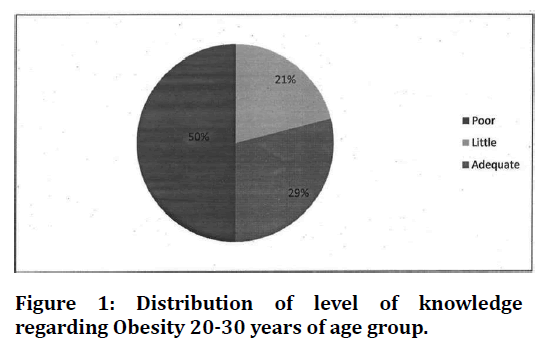Research - (2021) Volume 9, Issue 8
Knowledge Based Awareness on Precaution Measurement of Obesity among the Patients and their Care Takers
*Correspondence: AR Bharathi, Department of Nursing, Bharath Institute of Higher Education and Research, India, Email:
Abstract
Patient attenders will not maintain the dietary habits they are not having the habits of exercise, and maintenance of diet. In 30 years they got a diabetic Mellitus. The present study aimed to assess the knowledge regarding Obesity among 20 -30 years age group at Hindu Mission Hospital Tambaram. Our results indicate that a large proportion of patients and their care taker lacking much awareness regarding the importance of exercise and associated dietary habits. These findings emphasized the urgent need to develop national strategies for the prevention, detection, and treatment of overweight and the metabolic syndrome, to reduce the societal burden of cardiovascular disease in population.
Keywords
Body mass index, Hospital environment, Hospital nurses, Job satisfaction, Nutrition, Physical activityIntroduction
Obesity is when a person is carrying too much body fat for their height and sex. A person is considered obese if they have a body mass index (BMI) of 30 or greater [1]. Today’s way of life is less physically active then it used to be. People travel on buses and cars, rather than walking, and many people work in office, where they are sitting still for most of the day. This means that the calories they eat are not getting burnt off as energy [2]. Instead, the extra calories are stored as fat. Overtime, eating excess calories leads to weight gain. Without lifestyle changes to increase the amount of physical activity done on a daily basis, or reduce the amount of calories consumed people can become obese. The latest year with available figures, nearly a quarter of adults (over 16 years of age) in England were obese (had a BMI over 30) Just under a third of women, 32% were overweight (a BMI of 25-30), and 42% of men were overweight [3]. Amongst children (2-15 years of age), one in six boys and one in seven girls in England were Obese in 2008.The number of Overweight children was also around one in seven. The number of Overweight and Obese people is likely to increase. A scientific report used to guide government policy, has predicted that by 2025, nearly half of men and over a third of women will be Obese. Obesity can cause a number of health problems, such as a type 2 diabetes (a condition caused by too much glucose in the blood), and a heart disease. Being overweight or obese can also shorten life expectancy (how long a person should live). In Obese adults over 40 years of age, obesity can shorten life expectancy by 6-7 years. Obesity is treated by losing weight, which can be achieved through a heartily, calorie - controlled diet and increased exercise. The lifestyle changes necessary for long- term weight loss can be challenging to achieve, but there is a wide range of support available Surgery can be used to treat people who are severely Obese and have tried other methods of weight loss with no success. There are a variety of techniques, although these do carry risks and may not be suitable for everyone5. Usually, the patient attenders lack of awareness regarding the dietary habits, significant of exercise, and proper diet maintenance.
Methodolgy
The present study aimed to study to assess the knowledge regarding Obesity among 20 -30 years age group at Hindu Mission Hospital Tambaram. Quantitative approach and descriptive design was used in this study. The sample size was 30. A non-probability purposive sampling technique was adopted to select the sample in the study. Part of the study consisted of a schedule to assess the demographic characteristics such as age, religion, type of family, family income, No. of children, occupation. The knowledge questionnaires consisted of 10 questions totally each questions which correct answer carries one mark and incorrect answer carries no mark the total scoring for over all knowledge was 10. The interpret the level of knowledge regarding 20-30 years, Adequate : >76% to 100%, Moderately: >51% to 75% and Inadequate: <50%.
Results and Discussion
The data was collected from 30 persons analyzed according to the objectives of the study. Regarding knowledge 21% of them have little, 29% of them have adequate and 50% of them have poor knowledge (Figure 1). The investigator has drawn the following implications from the study which is vital concern for nursing services, nursing education, nursing administration and nursing research. As a nurse she has to plays a vital role in educating and motivating people for knowledge regarding Obesity. She can conduct an awareness programme regarding Obesity during the health days. In service education can be impaired to staff working in a hospital in order to make awareness about Obesity [4,5].

Figure 1. Distribution of level of knowledge regarding Obesity 20-30 years of age group.
Conclusion
Nurse as an educator incorporate the major study findings. In nursing curriculum at all level in order to well equipment the student to address the inadequate knowledge, to malwork to people for Obesity.
Funding
No funding sources.
Ethical Approval
The study was approved by the Institutional Ethics Committee.
Conflict of Interest
The authors declare no conflict of interest.
Acknowledegements
The encouragement and support from Bharath Institute of Higher Education and Research, Chennai, Tamil Nadu, India is gratefully acknowledged for providing the laboratory facilities to carry out the research work.
References
- https://www.nhlbi.nih.gov/files/docs/guidelines/prctgd_c.pdf
- Purnell JQ. Obesity. In Nabel EG. Edn. ACP Medicine, Hamilton, 2011.
- American Gastroenterological Association. AGA technical reviewon obesity. Gastroenterology, 2008; 123:882-932.
- Klein S. Obesity. In Melmed S. Edn. Williams textbook of endocrinology. 12th Edn 2011; 1605-1632.
- https://health.gov/sites/default/files/2019-09/paguide.pdf
Author Info
Department of Nursing, Bharath Institute of Higher Education and Research, Selaiyur, Chennai, Tamil Nadu, IndiaCitation: AR Bharathi, Knowledge Based Awareness on Precaution Measurement of Obesity among the Patients and their Care Takers, J Res Med Dent Sci, 2021, 9(8): 120-121
Received: 19-Jul-2021 Accepted: 10-Aug-2021
